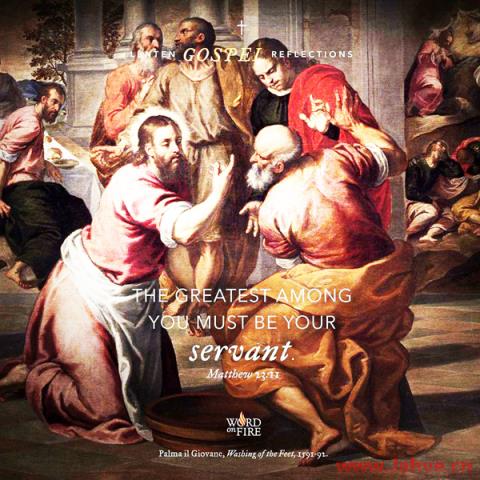 Bishop Barron翻译|Carrie2018-2-27
Bishop Barron翻译|Carrie2018-2-27 朋友们,今天的福音集中讨论宗教领导层的隐患和完美典范。这周内所有的神父、教长和布道者说教的对象应该是他们自己。耶稣以尖锐的目光注视并且狠狠地批评宗教领袖们多方面的腐败。在这个人人都能清晰看到神职人员的腐败和渎职的多事之秋,我们很难忽视这篇福音的现实意义。耶稣作出了最重要的区分。“经师和法利塞人坐在梅瑟的讲座上,凡他们对你们所说的,你们要行要守”。主在提醒我们,他们的确合理地处于教导的岗位上,因此对于他们的教导,我们应该给予相应的尊重。在公元四世纪,圣奥古斯丁面对多纳图斯派的质疑。他们声称只有无过失的、品格高尚的神父才能有权执行圣事。奥古斯丁说,不,执行者自身的邪恶并不损害圣事的有效性。这一原则具有重大意义。奥古斯丁效法着基督说,邪恶的人可以教导圣言和执行圣事。Friends, our Gospel for today focuses on the pitfalls and ideals of religious leadership. This is a week when priests, ministers, and preachers have to preach to themselves. Jesus turns his sharp eye and withering critique on the many ways that religious leaders fall into corruption.It is hard to miss the practical application of these texts to our troubled time, a period when clerical corruption and misconduct has been vividly on display. Jesus makes a distinction of capital importance. "The scribes and Pharisees have taken their seat on the chair of Moses. Therefore, do and observe all the things they tell you." The Lord reminds us that they do sit legitimately in teaching offices and that their teaching should be, accordingly, respected.In the fourth century, St. Augustine faced the challenge of the Donatists. They claimed that only pure and morally upright priests could legitimately dispense the sacraments. Augustine said, no, the personal evil of a minister does not compromise the validity of what he does sacramentally.This principle is of great significance. Augustine, in imitation of Christ, says that there can be evil men who do and teach the works of God.
朋友们,今天的福音集中讨论宗教领导层的隐患和完美典范。这周内所有的神父、教长和布道者说教的对象应该是他们自己。耶稣以尖锐的目光注视并且狠狠地批评宗教领袖们多方面的腐败。在这个人人都能清晰看到神职人员的腐败和渎职的多事之秋,我们很难忽视这篇福音的现实意义。耶稣作出了最重要的区分。“经师和法利塞人坐在梅瑟的讲座上,凡他们对你们所说的,你们要行要守”。主在提醒我们,他们的确合理地处于教导的岗位上,因此对于他们的教导,我们应该给予相应的尊重。在公元四世纪,圣奥古斯丁面对多纳图斯派的质疑。他们声称只有无过失的、品格高尚的神父才能有权执行圣事。奥古斯丁说,不,执行者自身的邪恶并不损害圣事的有效性。这一原则具有重大意义。奥古斯丁效法着基督说,邪恶的人可以教导圣言和执行圣事。Friends, our Gospel for today focuses on the pitfalls and ideals of religious leadership. This is a week when priests, ministers, and preachers have to preach to themselves. Jesus turns his sharp eye and withering critique on the many ways that religious leaders fall into corruption.It is hard to miss the practical application of these texts to our troubled time, a period when clerical corruption and misconduct has been vividly on display. Jesus makes a distinction of capital importance. "The scribes and Pharisees have taken their seat on the chair of Moses. Therefore, do and observe all the things they tell you." The Lord reminds us that they do sit legitimately in teaching offices and that their teaching should be, accordingly, respected.In the fourth century, St. Augustine faced the challenge of the Donatists. They claimed that only pure and morally upright priests could legitimately dispense the sacraments. Augustine said, no, the personal evil of a minister does not compromise the validity of what he does sacramentally.This principle is of great significance. Augustine, in imitation of Christ, says that there can be evil men who do and teach the works of God.

微信小程序
微信扫一扫体验

微信公众账号
微信扫一扫加关注
顶部
